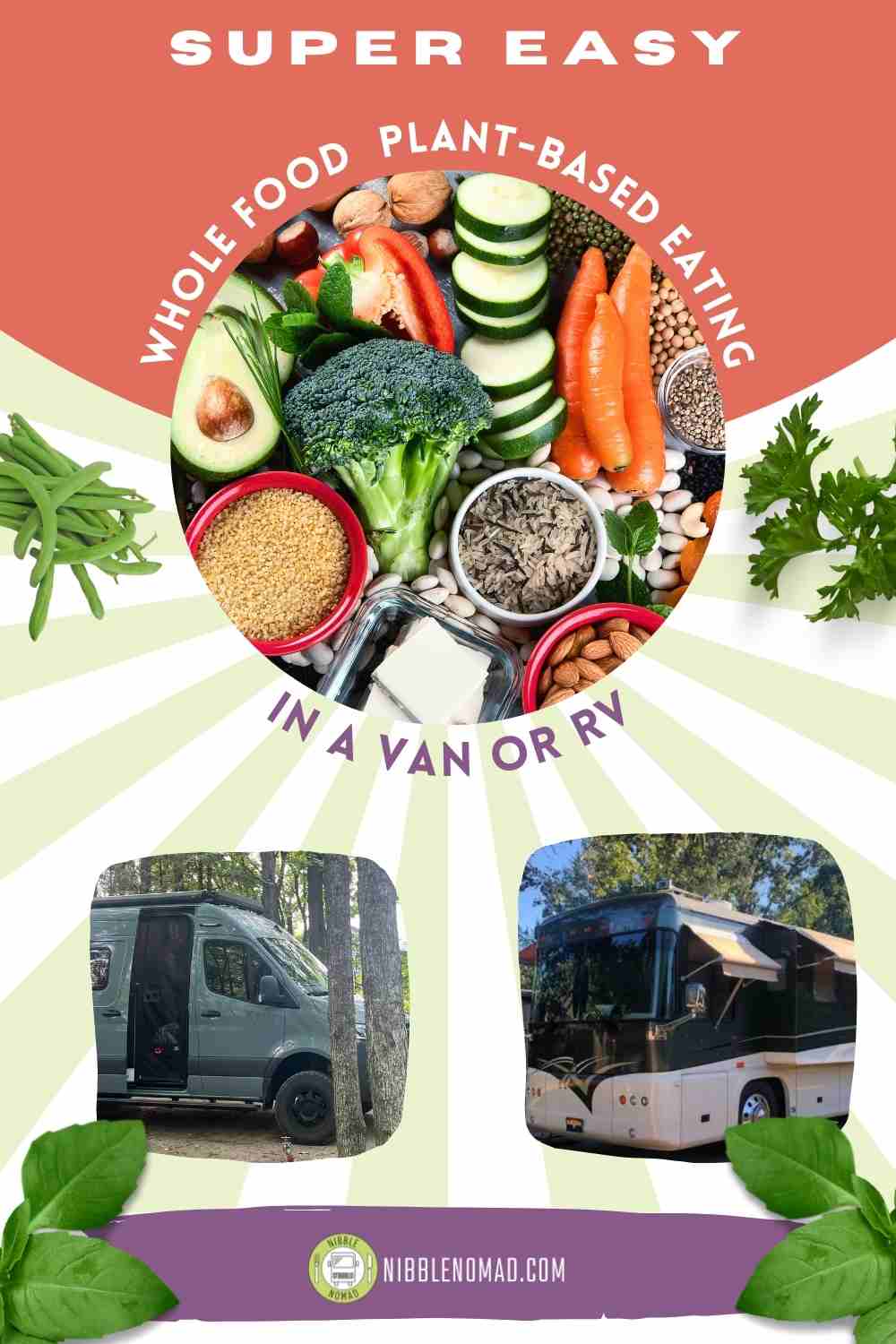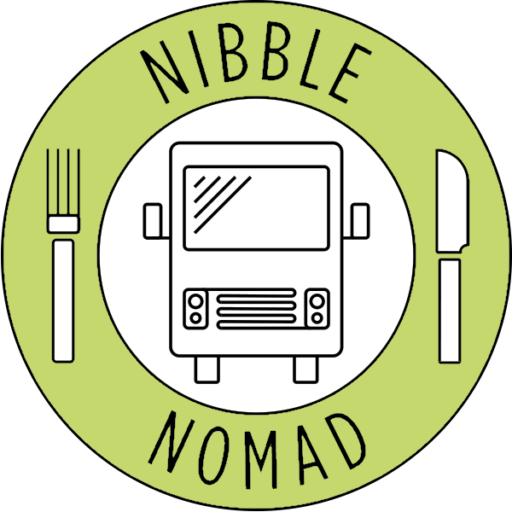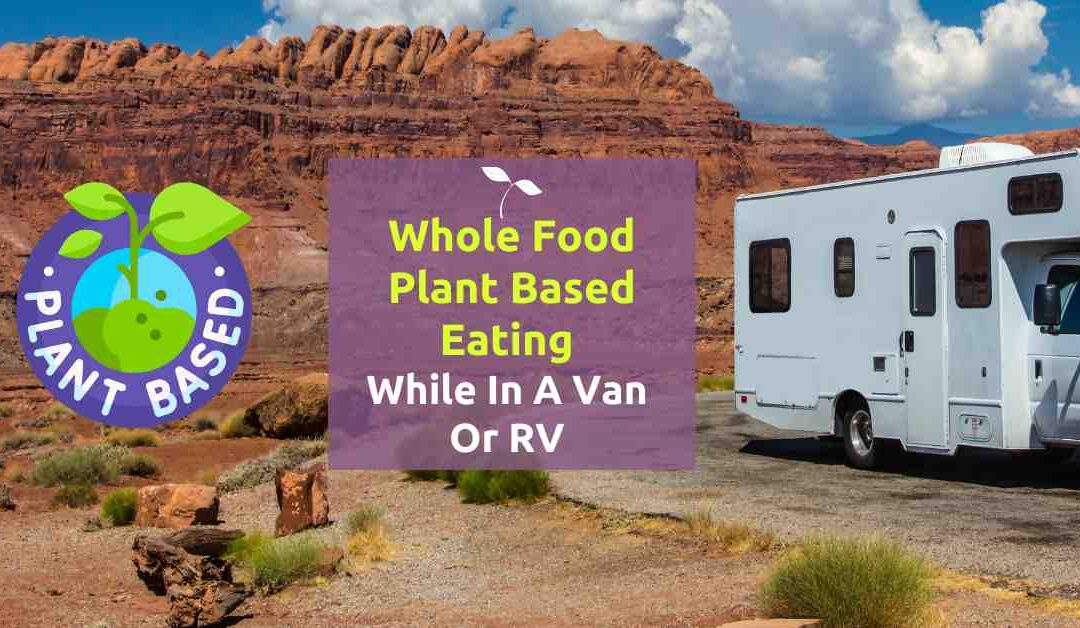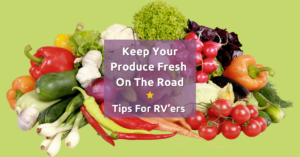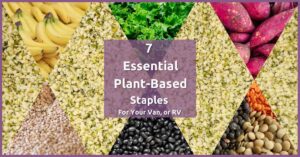What are the basics of Whole Food Plant-Based eating?
To be able to understand it, you have to start from the beginning.
What is it? This question is coming up more and more every day.
The best way to understand it is to start by breaking down what these food items are.
Let’s start at the beginning
Whole-Food, Plant-Based food refers to whole, unprocessed foods, or minimally processed foods. They don’t come from animals or animal by-products.
These foods focus on plants, including vegetables, fruits, whole grains, legumes, seeds, and nuts. That means that we only eat things that come from the earth, naturally.
There is a really easy way to be able to determine if something that you are thinking about eating is WFPB.
You have to ask yourself “did this item have parents or is it a by-product of something that had parents”. If it did then don’t eat it.
Therefore, this is what should make up the majority of what you eat on a daily basis.
The difference between whole food plant-based eating and veganism is that when you follow a vegan diet you don’t eat meat products butyou also don’t use anything that comes from an animal like leather and other animal based clothing. Whole food plant-based is regarding food only.

Examples of Whole-food, Plant-based
Examples of whole-food, plant-based are;
Whole grains, examples would be quinoa, buckwheat, millet, barley, brown rice, bulgar, wild rice, farro, popcorn, spelt, rolled oats, couscous, kasha, etc.
Tubers, examples are artichoke, yam, potato, sweet potato, taro, jicama, cassava, etc.
Legumes would be alfalfa, bean, peas, chickpea, lentil, soybeans, peanuts, etc.
Fruits would be apples, pears, banana, strawberries, figs, grapes, oranges, etc.
And lastly, Vegetables and other fresh foods would be lettuce, kale, collards, peppers, green beans, corn, etc.
Overwhelming evidence shows that dependence on highly processed foods, meats, dairy, and other animal products. This has made us dependent on costly medications and possibly detrimentally altered our lifespan.
There are plenty of reasons that it is a good idea to go plant-based.
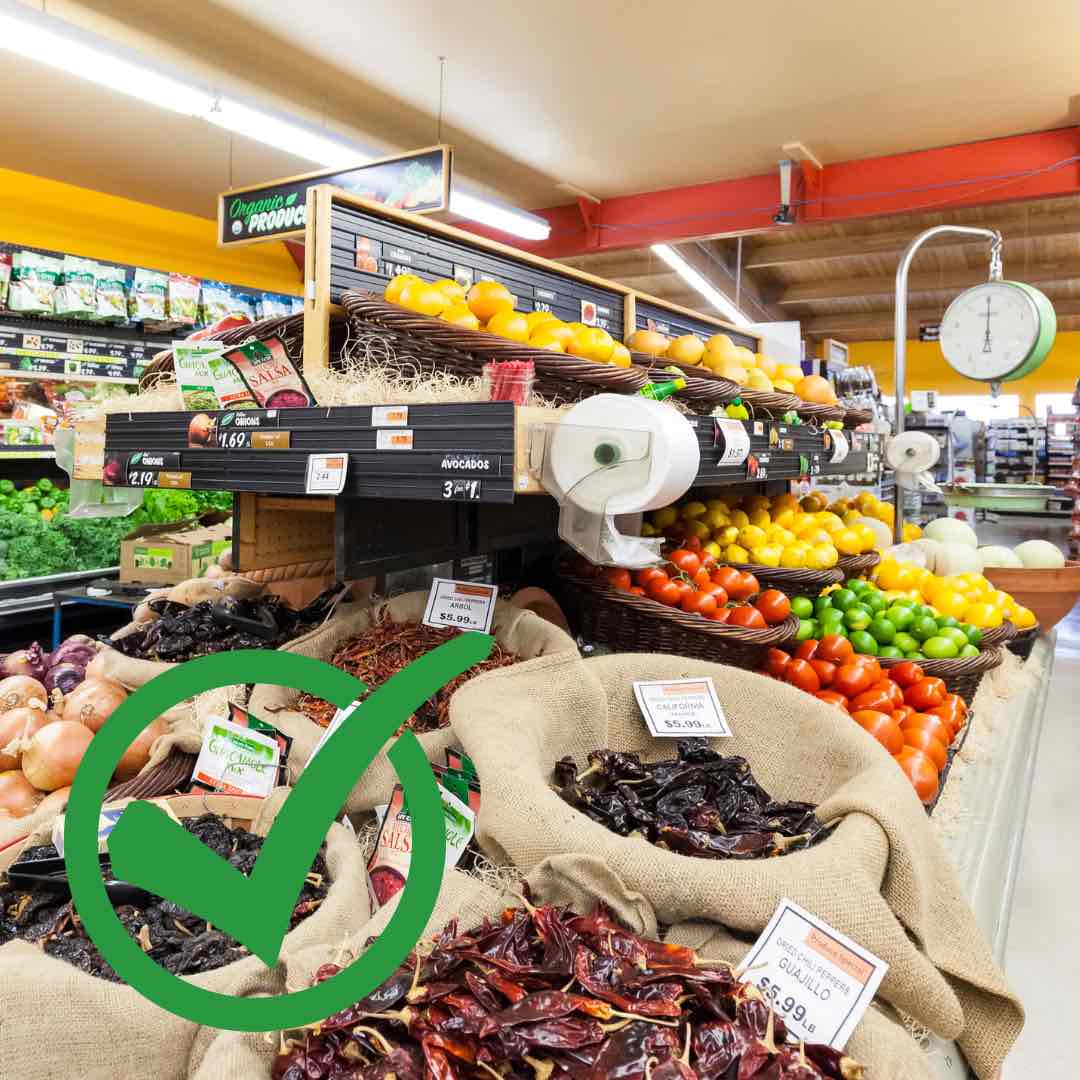
Let me give you some of the main reasons.
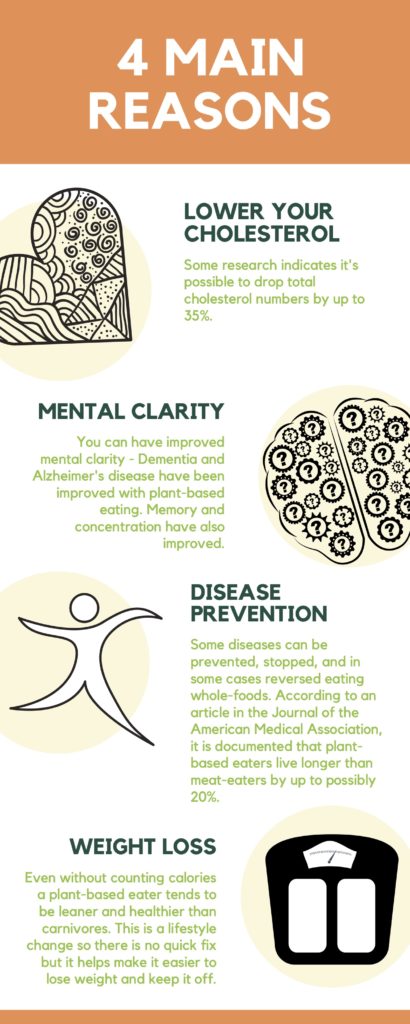
Here’s one more just for good measure….
Less Inflammation – Your body responds differently to different foods. Meat, cheese, oils, and other highly processed foods trigger your body’s inflammatory response. When your body has chronic inflammation it contributes to many serious health issues like heart attack, stroke, type 2 diabetes, and autoimmune diseases. Livescience.com
Protein is the question when referring to the basics of whole food plant-based eating
One of the first questions, and quite frankly the most asked question that comes from people considering the switch to whole-food, plant-based eating is will I get enough protein? Well, the answer to that is, most definitely.
For years we have been told that meat was really the only way to make sure that you have enough protein in your diet.
But if you think about one of the strongest mammals on the planet, the elephant, you need to ask yourself how much meat does that animal eat to get its protein. That would be NONE. That’s right, the almighty elephant only eats a whole-food, plant-based diet and gets all the protein it needs to stay alive and healthy.
People have been getting their proteins from fruits, vegetables, and grains for years.
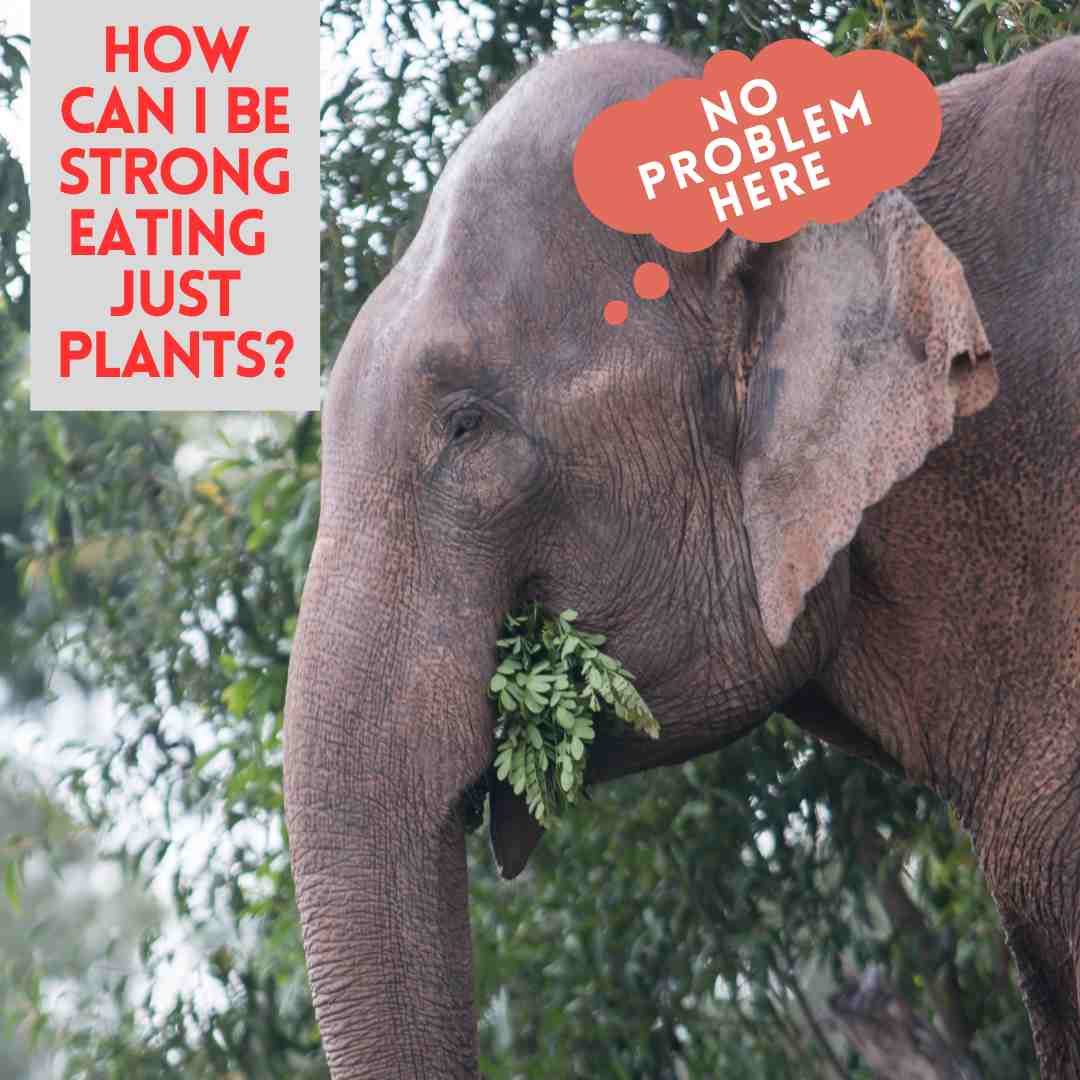
What about carbs within the basics of plant-based eating?
Another misconception about the whole-food, plant-based diet is that eating carbs will make you gain weight. Well, that can actually be correct if the carbs you eat and how you eat them are not done correctly.
- First of all, you have to skip processed carbs like nutrition bars, juice, bread, chips, crackers, cereal, and other grain-based products. These can all be part of a plant-based diet, but if you eat a lot of them because they really don’t fill you up, then you can overdo your carbohydrate intake.
- Secondly, it’s beneficial to get a good source of fat and protein in every meal. Some great fats would be nuts, seeds, and avocados. A few good proteins are tofu, edamame, green peas, hemp seeds, nutritional yeast, oats, beans, and seeds. Proteins and fats are essential to your cells, tissues, and organs.
- Finally, make sure that when you do eat carbs, you eat the right ones. Examples would be legumes like beans, root vegetables like carrots, and fruits like berries. Whole foods contain a lot of water, making you feel full longer and they can require more chewing, so you eat slower.
Nibbler Tip: Don’t try to make really complex recipes when starting a WFPB lifestyle. When we are really busy or on a travel day in our van, I just make a bowl of black beans, rice, and slices of avocado.
Related Posts
Finally
The basics of whole-food, plant-based eating lifestyle will help with ‘what ails ya.’
As a person living either in a geodesic dome or a van, I can tell you that preparing, storing, and consuming a plant-based diet is the easiest way to eat. Especially when living a nomadic lifestyle.
No worries about cross-contamination, storage safety, or high food costs. Life on the road affords you the ability to stop in different towns for farmer’s markets and small local food stands. That makes trying all different whole-food, plant-based items fun and easy.
Consulting with a registered dietitian or healthcare professional can help you develop a balanced and nutritionally adequate plant-based meal plan.
If you can’t have fun with your food, what’s the sense of eating it?
Remember, whole food plant-based eating doesn’t mean that you have to eat salads every day. I know we don’t.
Let us know your thoughts about eating a whole food plant-based diet. Please feel free to leave us a comment below and tell us if you have tried or are living a WFPB lifestyle.
